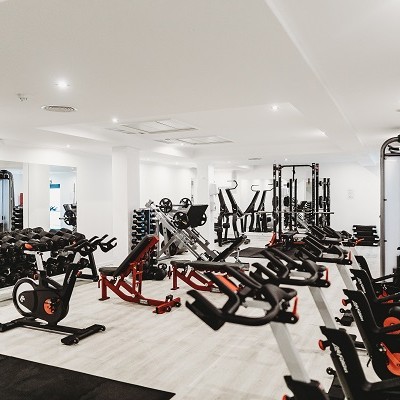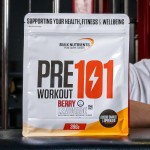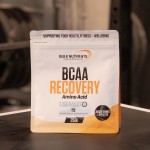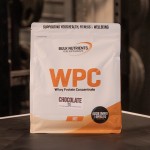What Is the Ideal Rep Range for Muscle Growth?

Are low reps or higher reps better for muscle growth?
Generally, rep ranges can be broken up into three categories:
Heavy: 1-5 reps
Moderate: 6-12 reps
Light: 15+ reps
Naturally, we want to know which of the three rep ranges we should be prioritising.
Only as recently as 2014 was the first study ever published to examine this properly, in the context of resistance-trained males. Too many previous studies were done on untrained subjects, with gym rats turning their noses up at any research that didn't directly examine subjects like them. This aforementioned study saw the experienced weight-trained men placed into two groups:
- "Bodybuilding-type" -- three sets of ten reps (30 reps)
- "Powerlifting-type" -- seven sets of three reps (21 reps)
The routines had the same total amount of weight lifted per session (volume load). They found:
- The "Powerlifting type" saw the biggest gains in strength
- BOTH routines resulted in similar muscle growth in the biceps
- The powerlifting group showed "clear signs of overtraining" by the end of the study, which meant it was difficult for it to be as fair as possible, as overtraining can lead to less muscle power and thus throw out the results of the study.
Moreover, whilst the volume load was matched, the number of reps was not (30 reps in the "bodybuilding-type" versus 21 reps in the "Powerlifting-type").

So to combat this, the same researcher in a fresh study took to rounding up more resistance-trained males of university age who regularly squatted and performed bench presses. They were placed into two groups consistent with two of the three different rep ranges as outlined at the start of this article:
- "Heavy" -- 2 - 4 reps per set
- "Moderate" -- 8 -12 reps per set
And the subjects performed three sets of seven exercises that worked all major muscles per workout, for eight weeks. This was going to be a better indication of lower versus high reps. They found:
- Overall muscle growth was superior in the "moderate" group.
- There were greater muscle gains in the biceps for the "moderate" rep group (~5% versus ~3%)
- There were also greater muscle gains in the "moderate" group for quadriceps (10% versus ~4%)
- Tricep growth was similar between both groups
- As consistent with prior research, strength gains were larger in the "heavy" group (in the squat the "heavy" group won out: 29% versus 16%) as with the bench press, but not as significant (10% increases in the "heavy" group and 4% in the "moderate" group).
Volume and rep range for muscle growth: The best rep range to maximise muscle size.
So, what do we take away from this?
- Training in the 6-12 rep range might be ideal for maximising muscle size.
- The 1-5 "Heavy" rep range will definitely make you stronger.
- Given the last study showed no differences in hypertrophy when the volume was the same, it seems that volume load is more important than rep range when it comes to muscle growth.
- Whether you prefer "Heavy" or "Moderate" loads, a higher volume may be the most important thing.

Now let’s put this knowledge into practice
So with that being said, let's put it into a hypothetical training day focusing on the chest:
- 5 x bench press (20 reps, 15 reps, 12 reps, 8 reps, 5 reps).
- 5 x incline dumbbell curls (12 reps, 8 reps, 5 reps, 5 reps, 5 reps).
- 3 x standing cable flies (15 reps, 12 reps, 5 reps).
- 2 x bench dips (15 reps, 15 reps).
This sample workout balances both "Heavy" and "Moderate" rep ranges. But the other way to balance your training is by focusing purely a "Moderate" rep range for the entire workout, to ensure overtraining doesn't occur. This would mean doing 8-12 reps (even as high as 20) to ensure you don't burn out like the "Powerlifting-type" subjects in the first study. This is referred to as a training "de-load."
But back to our sample workout, and you can see how we're swapping between the "Heavy" and "Moderate" rep ranges for muscle growth here whilst still allowing for muscle strength with enough volume in the mix. The higher reps prevent any overtraining and aren't as taxing on your body compared to the "Heavy" approach.
It's important to note that the same researcher suggests more than 10 sets per workout, per muscle, for muscle growth. A precise amount of sets for optimal growth is still yet to be determined, but we've gone for 15 sets in the sample workout above for safety.
The evidence surrounding rep ranges is still, surprisingly, somewhat limited. However, what we do know currently is that a moderate rep range of 8-12 reps per muscle growth might be ideal. Lifting heavy all the time can lead to injury and overtraining, and a balance between higher and lower reps, with a particular focus on training volume (more than 10 sets for each muscle per workout) is paramount for maximal muscle growth.

Meet Mason! He's on the Marketing Team here at Bulk Nutrients and is an amateur basketball player who loves the game.
He's tried many supplements to help him on the court and in general health.
More about Mason BrezinscakReferences:
Reference
- Kiely, J. Periodization Theory: Confronting an Inconvenient Truth. Sports Med 48, 753–764 (2018). https://doi.org/10.1007/s40279-017-0823-y
- Schoenfeld BJ, Contreras B, et al. Differential Effects of Heavy Versus Moderate Loads on Measures of Strength and Hypertrophy in Resistance-Trained Men. J Sports Sci Med2016;15: 715-722.
- Schoenfeld BJ, Ogborn D, Krieger JW. Dose-response relationship between weekly resistance training volume and increases in muscle mass: A systematic review and meta-analysis. J Sports Sci. 2017 Jun;35(11):1073-1082. doi: 10.1080/02640414.2016.1210197. Epub 2016 Jul 19. PMID: 27433992.
- Schoenfeld BJ, Ratamess NA, et al. Effects of different volume-equated resistance training loading strategies on muscular adaptations in well-trained men. J Strength Cond Res2014;28: 2909-2918.
Related Blogs

The Three Principles of Muscle Growth
Posted by Dayne Hudson
Estimated reading time: 10 minutes

New Study Into Slower Reps Finds Slightly Better Muscle Growth
Posted by Dayne Hudson
Estimated reading time: 5 minutes

Does Mixing Up Your Exercises Make a Difference to Gains?
Posted by Dayne Hudson
Estimated reading time: 5 minutes






























